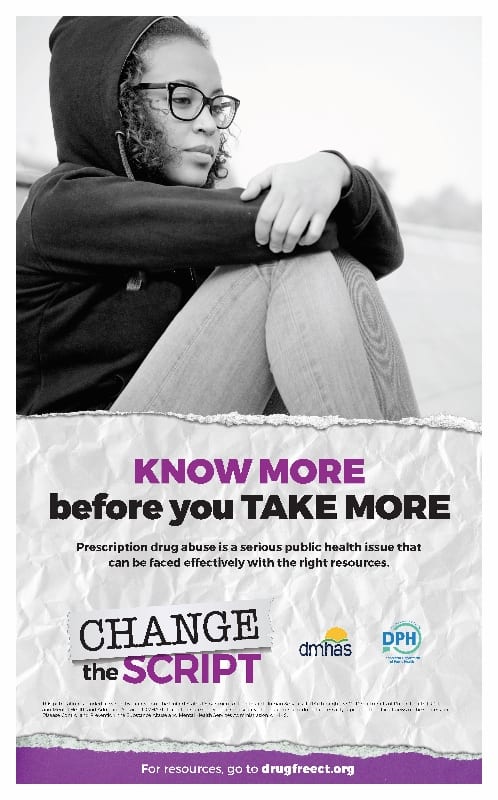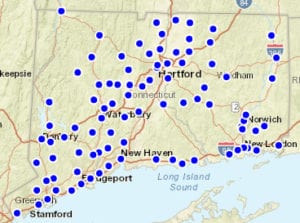

Change the Script: Opioid and Prescription Drug Misuse Prevention Program
Background and Overview: The misuse of prescription medication and opioid-based drugs has increased significantly over the years to become a public health concern in Connecticut. This misuse or abuse includes taking these medications in higher doses than prescribed, for a purpose other than that for which it was prescribed or taking a medication that was prescribed for another person or obtained off the streets. Opioid overdose is often characterized by a decrease in breathing rate which if not quickly addressed leads to death.
In Connecticut, residents are more likely to die from an unintentional drug overdose than a motor vehicle accident. Majority of these deaths are linked to overdose of prescription opioid painkillers. According to the 2013 CDC report, the Connecticut age-adjusted rate for drug induced mortality is 16.4 per 100,000 population compared to the nation rate of 14.6.
Change the Script: ‘Change the Script’ is a statewide public awareness campaign to help communities address the prescription drug and opioid misuse crisis. Uncas Health District (UHD) in collaboration with the Connecticut Department of Mental Health and Addiction Services (DMHAS), Department of Consumer Protection (DCP), Department of Children and Family Services (DCF), and Connecticut Department of Public Health (DPH) has launched an educational campaign for state residents that helps to increase awareness of the dangers of opioid and prescription drug misuse while focusing on decreasing the stigma of addiction and promoting life saving measures such a naloxone and treatment.
Risks Factors, Signs Of Overdose, What To Do If You See An Overdose
Common Risk Factors for
Opioid Overdose:
- Mixing opioids with other drugs, particularly alcohol or sedatives
- Resumption of use after a period of abstinence from opioid use, such as recent release from a rehabilitation center from incarceration
- Elderly persons may forget that they already took their medication and accidentally re-take the same medication
- Younger age, specifically the teens or early 20s exposed to peer pressure or a social environment where there is drug use

Signs of an opioid overdose:
- Face is extremely pale and/or clammy to the touch
- Body is limp
- Fingernails or lips have a blue or purple hue to them
- Vomiting or making gurgling noises
- Cannot be awakened from sleep or is unable to speak
- Breathing is very slow or stopped
- Heartbeat is very slow or stopped
What should I do if I see an overdose (or what I think is an overdose)?
- Call 911 immediately!
- Support the person’s breathing
- Administer naloxone (Narcan) if you have it
- Lay the person on their side once they have resumed breathing
- Stay with the overdosed person until help has arrived
Prescription drug overdose can be prevented by following promising and/or evidence-based recommendations for the safe use, storage, and disposal or medications.
Remember to program emergency numbers, such as the Poison Control Hotline (1-800-222-1222), into your phone to call in the event of a poisoning or overdose emergency or dial 911.
Safety: Use, Storage & Disposal
Safe Use:
- Tell your healthcare provider about all your medications
- Never share your prescription medications with anyone
- Never take prescription medication that is not prescribed for you
- Never take prescription medications more often or in higher doses than prescribed
- Never drink alcoholic beverages while taking prescription pain medications
- Taking prescription pain medications with other depressants such as sleep aids, anti-anxiety medications, or cold medications can be dangerous
- Properly dispose of all unused and expired prescription medications
Safe Storage:
- Store prescription medications out of reach of kids, family, and guests
- Know where your prescription medications are at all times
- Keep prescription pills in the original bottles with the labels attached, and with the child-restraint cap secured
- Keep track of how many prescription pills are in your bottle so you are immediately aware if any are missing
- Dispose of all unused and expired prescription medication properly. Proper storage and disposal of all medications is essential to health and safety!
Disposal of Unused/Unwanted Prescription Medication:
In Connecticut, there are designated areas known as Drop Box Disposal Areas. Many municipal police departments are now participating in the Medication Drop-Box Program. These drop boxes are managed by the police departments and are available 24 hours a day/7 days a week. This is a confidential free service that will help protect our environment and our youth!
 Drop Box Map in your local area/surrounding towns www.portal.ct.gov/DCP/Drug-Control-Division/Drug-Control/Local-Drug-Collection-Boxes
Drop Box Map in your local area/surrounding towns www.portal.ct.gov/DCP/Drug-Control-Division/Drug-Control/Local-Drug-Collection-Boxes
Local Drop Box locations at the Police Departments in:
- Norwich Police Department (off of Thames Street)
- State Police Troop E (off of I-395 North)
- Mohegan Tribal Police
- Montville Police Department
Safe Disposal at Home
- DO NOT FLUSH!! DO NOT POUR DOWN DRAINS!!!
- Take prescription drugs out of original containers
- Crush and mix all unused drugs with an undesirable substance such as used (wet) coffee grounds, moist unused cat litter, or spoiled food
- Throw container in the trash can on the same day the trash is collected. This extra safety measure can help prevent accidental overdose by children and pets
Conceal, remove, and destroy ALL IDENTIFYING PERSONAL INFORMATION (prescription label) from all medication containers before recycling them or throwing them away
UNCAS Health District – Change the Script & Narcan Training
Contact Constance Capacchione for more information.
Email: [email protected]
Phone: 860-639-5138
Helpful Links & Numbers
Norwich Prevention Council
http://ct-norwich.civicplus.com/510/Norwich-Prevention-Council
CT.gov Department of Mental Health and Addiction Services - General Information
https://portal.ct.gov/DMHAS/Programs-and-Services/Finding-Services/General-Information
Connecticut Department of Public Health Opioids and Prescription Drug Overdose Page
https://portal.ct.gov/dph/Health-Education-Management--Surveillance/The-Office-of-Injury-Prevention/Opioids-and-Prescription-Drug-Overdose-Prevention-Program
Poison Control Hotline (1-800-222-1222)
DIAL 911

Contact Uncas Health District
Our office is available Monday through Friday, 8:00 am - 4:00 pm, for all of the residents in our district.
Phone: 860-823-1189
Fax: 860-887-7898
Email: [email protected]
Address
Campbell Building
401 W. Thames Street, Suite 106
Norwich, CT 06360
Park in the back of the Campbell Building and enter through the Credit Union entrance.